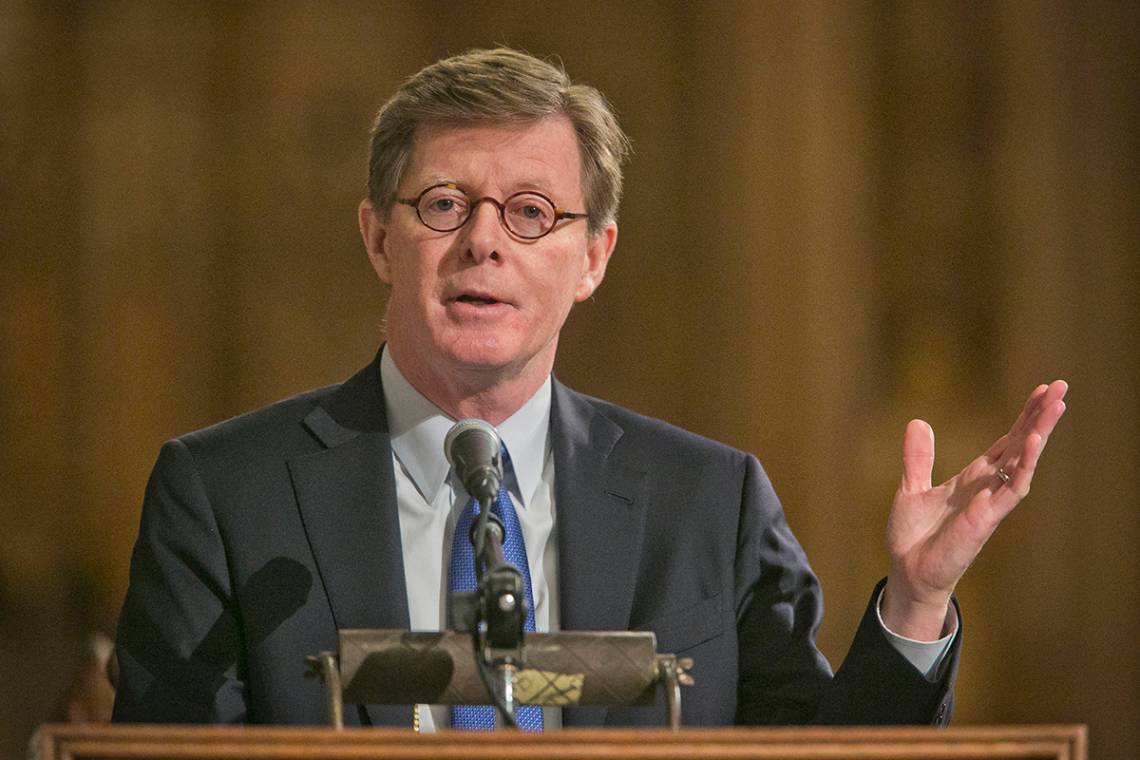Vincent Price: Efforts to Progress Toward the Future Dr. King Wanted

As President of Duke University, it is my honor to welcome you to this historic chapel for a celebration of the life of Reverend Dr. Martin Luther King, Jr. We gather today as well to celebrate of the trailblazing legacy of Dr. Samuel Dubois Cook, Duke’s first African American professor, who passed away this May.
I am also honored to welcome our distinguished guests, our colleague and Mayor Steve Schewel, our other elected officials, Dean Powery, and today’s speaker, Sherrilyn Ifill, the President and Director-Counsel of the NAACP Legal Defense and Education Fund.
We are of course not alone in this important commemoration. Every January, we join a great fellowship of towns and cities, schools and universities, congregations and communities of faith, and families and individuals around the world in remembering Dr. King’s abiding contributions to justice and equality.
Indeed, this celebration marks the passage of time in the Duke community, coming as it does after many commemorations over the years. Here in the chapel, we have hosted such luminaries of the civil rights movement as Ambassador Andrew Young, Harry Belafonte, Marian Wright Edelman, Maya Angelou, and the Reverend Joseph Lowery. And outside of these stone walls, beyond the stained glass, generations of Duke students, faculty, and staff have joined together each year in service to Durham and the surrounding region.
But these events don’t simply mark the passage of time. They also provide an opportunity to reflect on the progress we have made toward Dr. King’s vision of equality. They serve as a reminder of our responsibility to resist the forces of hatred and division that are not yet fully vanquished, a reminder that only through empathy, righteous witness, and a conviction to learn from the past can we ensure that the arc of the moral universe bends ever closer to justice.
This year, that reminder holds particular resonance at Duke. As many of you know, we have been engaged over these past few months in a difficult but productive conversation about our university history, a conversation informed by Dr. King’s example and the struggle for civil rights.
Led by a Commission on Memory and History, we have come together as a community to reflect on our past and take formal steps to build a more inclusive future. We have adopted new principles for engaging with controversy and injustice in Duke’s history. That conversation will continue this spring and beyond with exhibitions, panel discussions, and community events. And we will proudly open a new Research Center to address disparities in clinical care.
We have also renewed our community commitment to defending the right of all of our fellow students, faculty, staff, and neighbors to participate fully in university life, in accordance and alignment with our abiding values of service, learning, and faith.
These conversations have never been more important, as we have witnessed the tragic violence in Charlottesville, the shocking revival of white supremacy, the demonstrations in downtown Durham, and the events at this very Chapel.
Many of you already know that Dr. King visited our campus in 1964 and gave a speech in Page Auditorium, right next door. The Duke of Dr. King’s visit was still in the vice grip of a segregationist South – I have even been told that he spoke at Page only after he was denied the opportunity to preach from this pulpit.
But because of his vision and his labor, and with the support and struggle of many like him, progress was already underway. Just a year before his visit, the university had admitted its first African-American undergraduates, breaking the policy of discrimination that had governed our admissions since the institution’s founding. Over the intervening decades, through years of tension and protest, we would begin to build a university that lives up to our values. We would endeavor to learn from our past and to begin to mark the passage of time with confident steps toward justice.
At Duke, Dr. King repeated a refrain from his speeches throughout the South, from Birmingham to Richmond: “the time is always right to do what is right.”
Today’s celebration comes as we at Duke are taking action to continue our progress toward the future Dr. King wanted. That progress isn’t easy, and we may lose our footing from time to time, or lose ground along the way. But we must continue to step forward for what’s right, moving toward a community that can be an example to our neighbors and the world.